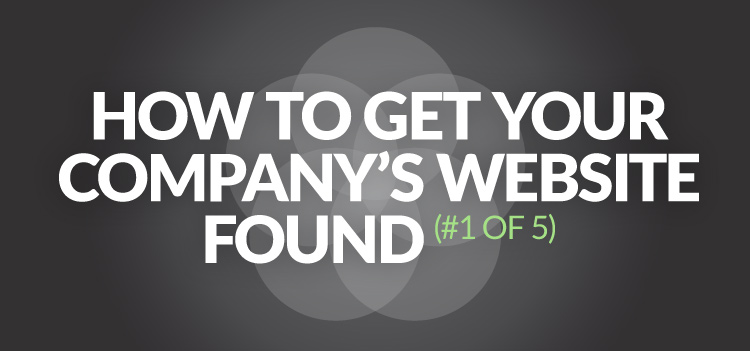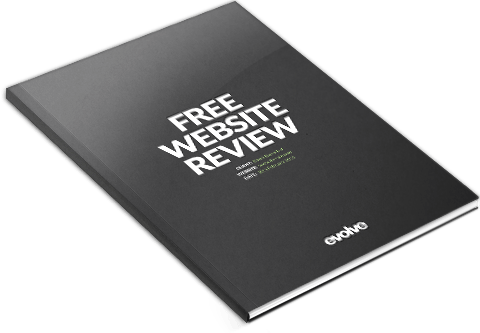How to get your company’s website found (#1 of 5)
AUTHOR: Tom Perkins
7 Seconds. That’s how long we have to make a great first impression. We all know it’s important to make a great first impression, but it’s no use making a great first impression if no-one finds you in the first place. In the world of websites, having a great website is actually the second step in the process, having a website that can be found by your customers or prospects needs to come first. In this post, the first in a series of five posts called ‘5 essential ingredients for a successful website’, I’m going to explain what goes into making sure your company’s website is found by search engines and viewed by customers and prospects.
Don't miss out
Subscribe today to receive updates on websites, business, sales and online marketing.
Subscribe nowX
Get all the latest content from our blog
Simply enter your email address below to receive updates on websites, business, sales and online marketing
We hate SPAM and promise to keep your email address safe
1. Let’s start at the beginning
The good news is getting the basics in place to get your website found isn’t difficult. Once you understand the key things that search engines look for in a good website, and what influences the order they display their results in, you’ll be taking a big step towards being found. Amazingly lots of business websites still don’t have these basics in place, or at least not setup as well as they could be. This means that just by getting these basics in place you can be ahead of most of the competition.
Let’s say, for example, you have a page on your website about your innovative new space shuttle cleaning service (I know, just go with it). It should go without saying that the main content on the page will talk about all aspects of space shuttle cleaning, the areas you cover and what makes you so damn good at cleaning space shuttles. Search engines are smart enough now to understand related terms, so don’t feel the need to stuff the text on your page with the phrase ‘space shuttle cleaning’. Just talk as you would to one of your customers or prospects and the search engines will understand this.
The next step is to make sure that the other parts of the page are all setup as well as they could be. Let’s talk through these one by one:
Page Title
This is the title of the page (obvious I know) that appears in the browser tab at the top of the window. Importantly it also appears as the blue title in search results. At the very least you should make sure that the phrase ‘space shuttle cleaning’ is featured in the page title. Even better, try to make this title engaging or intriguing to encourage people to click through to your website from search results. Bear in mind though, search engines will only display titles up to a certain length so try to keep your title under 55 characters.

URL (i.e. the address of the page)
The URL of a page (standing for Uniform Resource Locator just in case you were curious) is basically the address of a web page. This plays a role in the search engines deciding if your page is relevant to a user’s search. Wherever possible try to make your page addresses as simple and easy to understand as possible, and also try to include the phrase you want to be found for. For example, rather than using a long and complicated address such as ‘nasa.com/ft/en/space.html’ (I challenge you to memorise that one), use something like ‘nasa.com/space-shuttle-cleaning’. Not only is this easier for people to understand and remember, but it also helps to give the search engines a clue to what the page is about and will ultimately help to improve your rankings.
Note: If you’re creating a new page on your site you can call the page whatever you choose. But you need to be careful if you’re changing the address of a page that already exists. The reason for this is that search engines will already have memorised the page at it’s current address and users may have already bookmarked the page. In this case, you’ll need to setup what’s called a ‘301 redirect’ which basically means that anyone using the old page address will be automatically redirected through to the new page address. If you’re not sure on how to do this feel free to give me a call (01264 735 333), I’ll be happy to help.
Headline
The main headline on the page is probably the most important element on the page. Not only should you make sure that the main headline uses your key phrase ‘space shuttle cleaning’, but also try to make sure that the title is what’s called an H1 heading. An H1 is all to do with the way the website is built. There are 6 levels of heading (H1 through to H6) and these are intended to give users and search engines a clue as to the importance of the heading. By making sure your main page heading is an H1, you’re letting everyone know that it’s the most important thing on the page.
Note: If you’re not sure on how to check if your website’s page titles are H1’s, feel free to give me a call (01264 735 333), it’s an easy thing to check.
2. Think about the language your customers and prospects use
Often the phrases you use within your company may not be the phrases your customers or prospects would use to talk about what you do. For example, staying with the Space Shuttle analogy (I’ve started so I’ll finish), people in the industry may call it a ‘reusable low Earth orbital spacecraft system’ but you or I would probably call it a ‘Space Shuttle’. If your website talked about ‘reusable low Earth orbital spacecraft systems’ then people searching for ‘Space Shuttles’ would be unlikely to find it. Here’s couple of ways you can check whether you’re using the same language as your customers or prospects:
Use Google predictive search
Have you ever noticed how when you start to type into Google (other search engines are available) it suggests other related searches. This can be a good way to see popular searches around your chosen phrase. For example, if we type ‘space shuttle’ into Google it suggests the following possible searches:

Talk to your customers
I know, I know, that’s a crazy idea! The best way to understand what your customers or prospects would type into search engines when looking for a company like yours is to simply ask them. Bear in mind that not all customers or prospects would necessarily search for identical phrases so it’s worth asking a selection of them to get a feel for the various phrases they may use.
3. Related content can also rank well
So we’ve made sure you’re using the right phrases and we’ve made sure that the relevant page on your website is setup in the right way. Something else to think about is related content such as Case Studies.
Case studies give a great opportunity to not only create a second or third page on your website talking about a particular topic, but they also allow you to get into project specifics which can help you get found for really detailed searches.
Let me give you an example. You offer space Shuttle Cleaning services (last time I use this analogy, I promise) and last year you cleaned the Challenger Space Shuttle at the Kennedy Space Centre in Florida. If a prospect is looking for someone to clean his Challenger Space Shuttle and he lives in Florida (starting to regret this analogy now), he may well search for ‘Challenger Space Shuttle Florida’. If you happen to have a case study on your website that talks in some detail about how you cleaned the Challenger Space Shuttle in Florida then that case study is highly relevant to his search and should rank really well in the search results.
I’ve seen this work really well for clients of mine, meaning they not only come first in search results for a specific service they offer, but they also come second and third with related case studies. I’ve also seen super specific case studies generate leads just from the fact that they were super specific and other prospects were searching for this specific service.
Conclusion
Hopefully that gives you a few things to check or to put in place to make sure your company’s website gets found by your potential customers. If you have any questions or need any help or advice, feel free to give me a call (01264 735 333) or leave me a comment below. Coming up in the next post in this series, I’ll explain how to ensure your company’s website makes a great first impression.


